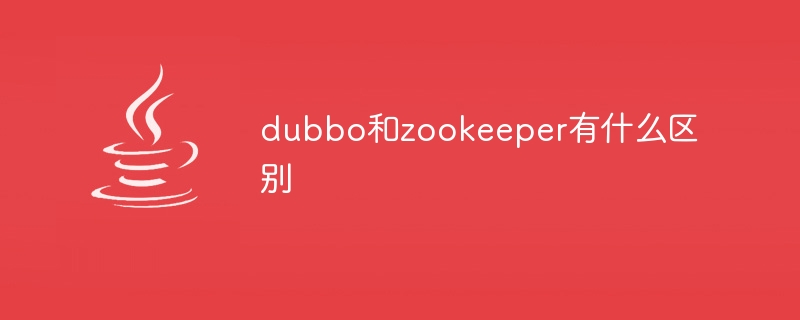The difference between dubbo and zookeeper: 1. Function positioning; 2. Usage scenarios; 3. Data storage and coordination; 4. Integration and relationship; 5. Performance and reliability; 6. Scalability and flexibility; 7. Community and ecosystem. Detailed introduction: 1. Function positioning. Dubbo is a high-performance service framework, mainly used to build distributed services and microservice architecture. Zookeeper is an open source distributed coordination service, mainly used to maintain and manage distributed systems. Configuration information, naming services, distributed locks, etc.

The operating system for this tutorial: Windows 10 system, DELL G3 computer.
Dubbo and Zookeeper are two different distributed system components, each with different functions and characteristics. The following are the main differences between Dubbo and Zookeeper:
1. Function positioning:
- Dubbo: is a high-performance service framework, mainly used for Build distributed services and microservices architecture. It provides functions such as service registration, discovery, load balancing and remote calling, and is dedicated to solving service governance issues. Dubbo's core functions focus on service registration and discovery, load balancing, remote calling and other service governance aspects.
- Zookeeper: is an open source distributed coordination service, mainly used to maintain and manage configuration information, naming services and distributed locks in distributed systems. It provides high availability, consistency and reliability of data storage and coordination services. Zookeeper mainly focuses on distributed coordination, including configuration management, naming services, distributed locks and other functions.
2. Usage scenarios:
- Dubbo: mainly used to build microservice architecture and provide service governance functions, such as service registration and discovery , load balancing, etc. It is suitable for distributed systems that require high performance, scalability and stability.
- Zookeeper: Mainly used to maintain and manage the configuration information, naming services and distributed locks of distributed systems. It is suitable for systems that require distributed coordination and management, and can provide consistent and reliable data storage and coordination services.
3. Data storage and coordination:
- Dubbo: Mainly focuses on the governance of services and does not directly involve data storage and coordination. It relies on other mechanisms or services (such as Zookeeper) to implement certain coordination functions.
- Zookeeper: Provides a distributed data storage and coordination mechanism, allowing multiple nodes to work together and maintain consistency. It provides high availability and reliability data storage services, and is suitable for scenarios such as configuration management and naming services.
4. Integration and relationship:
- Dubbo and Zookeeper: Dubbo can be integrated with Zookeeper and use Zookeeper as a service registration center. Zookeeper can be used as the basis of Dubbo's service discovery module to provide service registration and discovery functions. In Dubbo, Zookeeper is modified for service registration and combined with Dubbo's communication method to provide a high-performance remote calling solution.
5. Performance and reliability:
- Dubbo: Excellent in performance, especially in the communication method using long links, relatively Higher performance than other HTTP protocol-based requests. Dubbo is based on the TCP/IP protocol and has very high interactive performance. It supports anonymous parameter passing, implicit parameter passing, generalized calling and other functions.
- Zookeeper: Provides data storage and coordination services with high availability, consistency and reliability. It plays an important role in distributed systems and ensures distributed consistency. However, Zookeeper may have a problem of taking too long to elect a leader in some cases, which may affect the availability of the service.
6. Scalability and flexibility:
- Dubbo: is relatively more flexible, focuses more on service invocation and governance, and provides a wealth of Service governance strategies and customization options. Developers can carry out customized development according to actual needs.
- Zookeeper: Although it also has certain flexibility and scalability, its core functions mainly focus on distributed coordination and data storage, rather than service governance.
7. Community and ecosystem:
- Dubbo: With a large user community and a rich ecosystem, it can provide a wide range of resources and support. At the same time, Dubbo has been integrated with other open source projects such as Spring Cloud to form a more complete ecosystem.
- Zookeeper: Although it is also a widely used distributed coordination service, its community size is relatively small. However, due to the importance of its core functionality, Zookeeper is still an open source project that is continuously maintained and widely used.
In summary, Dubbo and Zookeeper are two different distributed system components, focusing on service governance and distributed coordination respectively. They differ in functional positioning, usage scenarios, performance characteristics, etc. Choosing which component to use depends on factors such as specific project needs, team skills, and resources.
The above is the detailed content of What is the difference between dubbo and zookeeper. For more information, please follow other related articles on the PHP Chinese website!
Statement:The content of this article is voluntarily contributed by netizens, and the copyright belongs to the original author. This site does not assume corresponding legal responsibility. If you find any content suspected of plagiarism or infringement, please contact admin@php.cn
